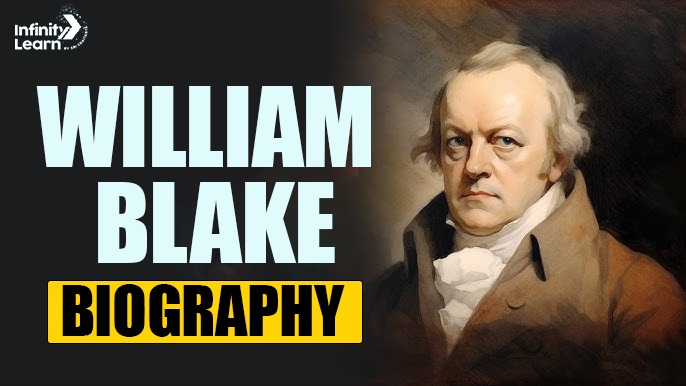Table of Contents
William Blake was an English poet, painter, and print maker who lived from 1757 to 1827. He is now considered one of the most important figures in the history of English literature and visual arts. Despite his lack of formal education and his work being largely ignored during his lifetime, Blake’s creativity, imagination, and deep spiritual beliefs have made him an enduring figure in the arts. This William Blake biography provides an overview of his life, his most famous works, and his legacy.

William Blake Biography Overview
| Aspect | Details |
| Full Name | William Blake |
| Born | November 28, 1757, Soho, London |
| Died | August 12, 1827, London |
| Occupation | Poet, Painter, Printmaker |
| Notable Works | “Songs of Innocence,” “Songs of Experience,” “The Tyger,” “The Lamb” |
| Artistic Technique | Illuminated printing |
| Major Themes | Innocence, Experience, Spirituality, Human Condition |
| Personal Beliefs | Mysticism, Visionary Experiences, Rejection of Traditional Religion |
| Legacy | Considered a visionary figure in literature and visual arts, influencing later generations of poets, artists, and thinkers. |
William Blake Early Life and Education
About William Blake: Born on November 28, 1757, in Soho, London, William Blake was the third of seven children. His father, James Blake, was a hosier, and his mother, Catherine Wright Armitage Blake, was a homemaker. From an early age, Blake displayed a keen interest in art and literature, and his parents supported his talents. At the age of ten, he began attending Henry Pars’ Drawing School, where he learned the basics of art.
Blake was also a self-taught poet. He started writing poetry at a young age and was heavily influenced by the Bible, which remained a profound source of inspiration throughout his life.
William Blake Artistic and Literary Career
William Blake Poems: Blake is best known for his unique blend of visual art and poetry. His most famous works include the illustrated collections “Songs of Innocence” (1789) and “Songs of Experience” (1794). These collections include some of his most celebrated poems, such as “The Tyger,” “The Lamb,” and “The Chimney Sweeper.” In these works, Blake explored themes of innocence, experience, spirituality, and the human condition, often using stark contrasts and symbolic imagery.
Blake’s artistic style was equally innovative. He developed a technique he called “illuminated printing,” where he combined his poetry with illustrations on copper plates, which he then printed and hand-colored. This method allowed him to control the entire creative process, from writing to visual presentation.
William Blake Personal Beliefs and Philosophy
Blake was deeply spiritual, though he rejected traditional religion. His works often contain references to mysticism and visionary experiences. He believed in the power of the imagination and considered it the primary source of artistic and poetic inspiration. Blake’s personal philosophy was heavily influenced by his mystical experiences, which he often described as seeing visions of angels, spirits, and other supernatural entities.
William Blake Later Life and Legacy
In his later years, Blake continued to create both poetry and art, though he struggled financially. Despite his lack of commercial success during his lifetime, his work was admired by a small circle of friends and fellow artists. Blake’s final years were spent working on a series of illustrations for Dante’s “Divine Comedy,” which remained unfinished at the time of his death.
Blake passed away on August 12, 1827, in London. He was buried in an unmarked grave in Bunhill Fields, though a memorial stone now marks his resting place.
William Blake Biography PDF: For those interested in a more in-depth study of Blake’s life and works, there are numerous William Blake biography PDFs available online, offering detailed analysis and exploration of his contributions to literature and art.
Conclusion
William Blake’s work remains a powerful testament to the potential of the human imagination. His visionary poetry and art continue to inspire and influence new generations of writers, artists, and scholars. For those looking to delve deeper into his life, William Blake biography in English and William Blake biography PDF resources are widely available and provide extensive insights into this remarkable figure’s life and work.
William Blake Biography FAQs
Who was William Blake?
William Blake was an English poet, painter, and printmaker known for his visionary works that combined poetry with unique illustrations. He lived from 1757 to 1827.
What are some of William Blake's most famous poems?
Some of William Blake's most famous poems include The Tyger, The Lamb, and The Chimney Sweeper, all of which are part of his collections Songs of Innocence and Songs of Experience.
How did William Blake create his artworks?
William Blake developed a technique called illuminated printing, where he combined his poetry with illustrations on copper plates, which were then printed and hand-colored.
What themes did William Blake explore in his work?
Blake's works often explore themes such as innocence, experience, spirituality, and the human condition, using symbolic imagery and visionary elements.
Where can I find more detailed information about William Blake's life?
You can find detailed information in various William Blake biography PDFs available online, as well as biographies in English that provide in-depth insights into his life and contributions to literature and art.









